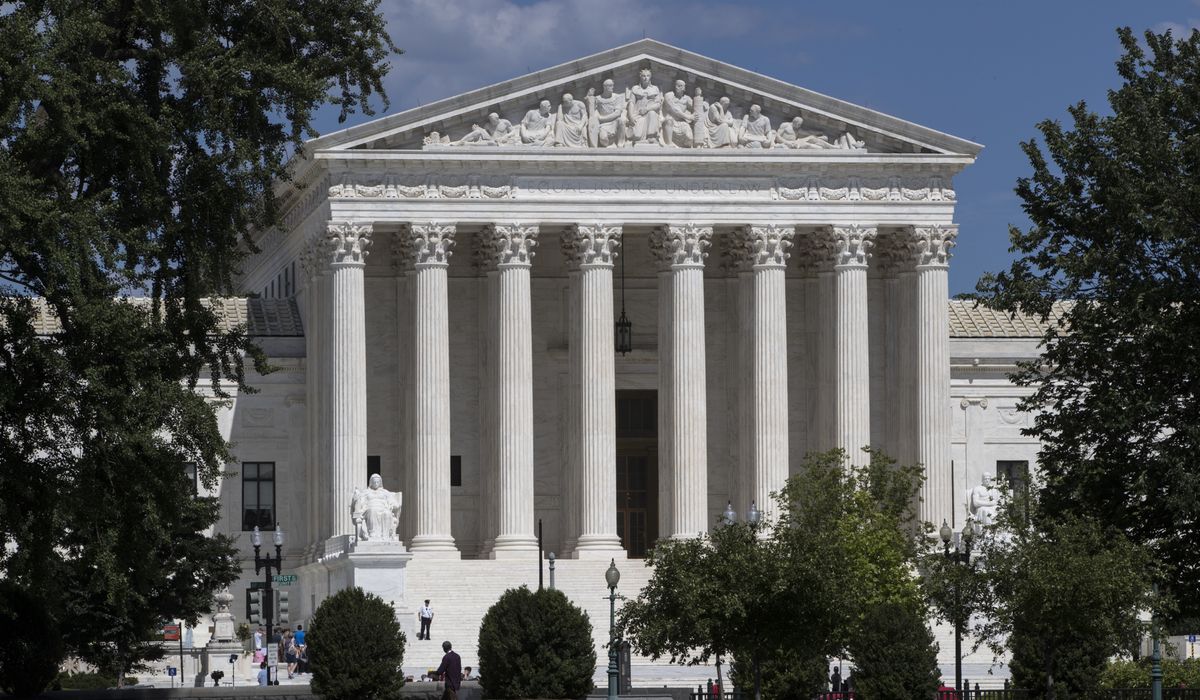


Suppose you think same-sex couples are the victims in the legal battle over marriage.
In that case, Kate Faust says you are wrong: It is the children who are forced to navigate a world without their biological parents because of the trickle-down effect of the Supreme Court making same-sex marriage a right, which also redefined adoption and other family laws that led to more neglect and abuse.
Ms. Faust, founder and president of Them Before Us, a global children’s rights nonprofit, says the fallout from the Supreme Court’s 2015 ruling legalizing same-sex marriage has blown up the nuclear family and created a “legal regime that has victimized and commodified” children.
“The last 10 years have made one thing unmistakably clear: we can either recognize gay marriage or we can recognize a child’s right to the mother and father. We can’t do both,” Ms. Faust said during an “Overturn Obergefell” event at the National Conservatism conference this week. “If we are to retake legal marriage, we highlight the real victims, the children starved of maternal or paternal love, acquired by predators, mass produced, trafficked across borders, struggling with identity confusion, subjected to risky households.”
While most Americans support gay marriage, Ms. Faust insists that if the traditional family values forces rally around that line of child-centric message, it will have a domino effect that sparks changes to public policy and public opinion, and builds momentum for the biggest prize: getting the Supreme Court to overturn Obergefell v. Hodges, the 2015 decision that established the fundamental right to marry for same-sex couples.
Reversing Obergefell, much like the overturning of Roe v. Wade, would send the issue back to the states to decide.
Social and religious conservatives are eager to put the genie back in the bottle 10 years after the Supreme Court extended marriage rights for same-sex couples under the 14th Amendment’s due process protections.
Critics have described the ruling as “legal fiction” and a “colossal failure.” They say that stripping the traditional gender-based meaning of marriage has paved the way for the gender ideology movement.
Supporters have hailed it as a victory for equality and the modern family, and are enraged by the continued attempts from the “extremist right wing” to strip them of their marriage rights.
Conservatives see glimmers of hope. The Supreme Court has moved to the right since 2015, and the justices’ 5-4 decision to overturn Roe V. Wade, the 1973 decision that established a constitutional right to abortion, demonstrated that liberal precedent can be undone.
Conservatives also believe that the media landscape has changed, making it harder for traditional news outlets to silence and belittle their beliefs.
They are somewhat optimistic or at least bemused by the prospect of pop music star Taylor Swift’s engagement to NFL player Travis Kelce making traditional marriage sexier for younger generations.
Still, the jury is out on how much support there is outside GOP circles for reversing course on gay marriage.
Gallup tracking polls show that since 2021, the percentage of U.S. adults who think marriages between same-sex couples should be recognized with the same rights as traditional marriages has fluctuated between 68% to 71%.
At the same time, the partisan divide on the issue has sharpened, with 88% of Democrats and 76% of independents supporting same-sex marriage. Meanwhile, Republicans’ support has fallen to 41% from 55% in 2021.
Gallup says the 47-point gap between Republicans and Democrats is the largest since it began tracking the question 29 years ago.
The findings help explain why Democrats are up in arms over the prospect of the Supreme Court taking up the issue, and Republicans are cheering it on.
Both parties are keeping close tabs on the Supreme Court’s handling of a July petition filed by former Kentucky clerk Kim Davis that asks the justices to overturn Obergefell v. Hodges and reverse the damages she was ordered to pay to the same-sex couple she refused to grant a marriage license, citing her religious beliefs.
“The Supreme Court apparently is taking it seriously,” John Eastman, the lawyer who helped craft President Trump’s election challenge strategy in 2020, said at the National Conservatism conference.
Mr. Eastman said he took note after the court, in a rare move, asked the same-sex couple at the heart of the case to respond to the Davis petition.
“The fact that the Supreme Court called for a response in the Kim Davis case suggests to me they’re very interested in that case,” he said.
Mr. Eastman predicted that if the court takes the case, the justices will be limited to the issue of religious liberty, instead of trying to gut the entire ruling.
“We should be very clear in the Kim Davis case, this wasn’t about the couple being able to get a marriage certificate under the auspices of Obergefell — they got one,” he said. “It was getting it from her despite her religious objection. It was an Orwellian bend-the-knee move.”
The Human Rights Campaign has sought to ease concerns, saying the Supreme Court case is “centered around damages and attorney fees.” They also said the 2022 Respect for Marriage Act “protects federal marriage rights for same-sex and interracial couples by requiring all states and the federal government to recognize gay marriages performed in states where they are legal.
“We know the extremist right wing won’t stop coming for our marriages, but HRC has always been prepared for this, and we aren’t letting up,” HRC said last month.
• Seth McLaughlin can be reached at smclaughlin@washingtontimes.com.
